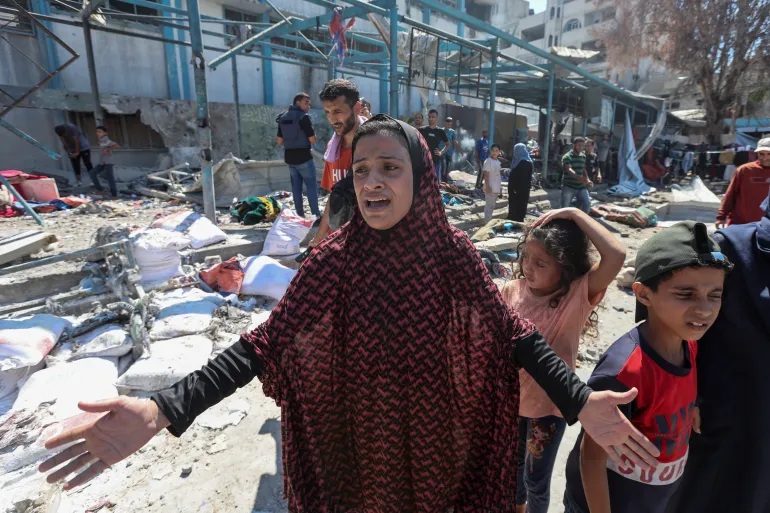Negotiations between Israel and Hamas over a potential ceasefire and hostage release deal in Gaza are teetering on the edge of failure, according to Palestinian officials close to the talks taking place in Qatar.
A senior Palestinian source told the BBC that Israel appeared to be deliberately stalling the process.
The official accused Israeli Prime Minister Benjamin Netanyahu’s administration of using the talks merely to “buy time” while Netanyahu visited Washington earlier this week.
The Israeli delegation sent to Doha, the official claimed, lacked the authority to make substantive decisions, particularly on major sticking points such as troop withdrawals and the delivery of humanitarian aid.
Despite Netanyahu’s optimistic tone before departing the U.S. on Thursday, expressing hope for an agreement within days, tensions behind the scenes have deepened.
Since the previous Sunday, eight rounds of indirect, or “proximity,” talks have taken place in Doha, with the two parties meeting in separate locations.
These discussions have been mediated by Qatar’s Prime Minister Sheikh Mohammed bin Abdul Rahman Al Thani, senior Egyptian intelligence officials, and U.S. envoy Brett McGurk.
Throughout the negotiations, the mediators have shuttled between the two delegations, conveying numerous oral and written proposals.
However, by Friday night, Palestinian insiders revealed to the BBC that the talks were close to unraveling.
Both sides were reportedly locked in disagreement over two core issues: how humanitarian aid should be delivered and the scale of Israel’s military pullback from Gaza.
Hamas has insisted that humanitarian relief should be managed by United Nations agencies and international NGOs.
In contrast, Israel is pushing for a mechanism backed by itself and the U.S., the Gaza Humanitarian Foundation (GHF), to oversee aid distribution, a plan that has drawn considerable controversy.
Mediators noted that while some progress had been made in narrowing differences on this point, no final agreement has yet emerged.
More contentious, however, is the dispute over Israeli military positions.
During earlier rounds of negotiation, Israeli representatives reportedly submitted a written message pledging to establish a limited buffer zone within Gaza, extending 1 to 1.5 kilometers deep.
This, Hamas indicated, could serve as a basis for further discussion.
But when Hamas requested a detailed map outlining Israel’s proposed withdrawal zones, the contents contradicted previous promises.
The map revealed Israeli intentions to maintain much deeper buffer zones, up to 3 kilometers in some locations, and retain a military presence across significant areas of Gaza.
The proposed zones included all of Rafah in the south, 85% of Khuzaa near Khan Younis, large sections of Beit Lahia and Beit Hanoun in the north, and eastern neighborhoods of Gaza City such as Zeitoun, Shejaiya, and Tuffah.
Palestinian officials said the map undermined any remaining trust, accusing Israel of negotiating in bad faith.
One senior negotiator claimed Israel’s delegation used the talks to project an illusion of progress and support Netanyahu’s diplomatic narrative during his U.S. trip.
“They were never serious about these talks,” the negotiator said.
The same official further alleged that Israel’s broader objective is to forcibly displace Palestinians under the guise of humanitarian planning.
He cited Israeli Defense Minister Israel Katz’s proposal to establish a so-called “humanitarian city” in Rafah as a step toward mass displacement.
Katz had instructed the military to prepare for a new encampment initially housing 600,000 Palestinians, with eventual capacity for Gaza’s full population of over 2 million.
Entry would be conditional upon Israeli security screening, and those inside would not be permitted to leave.
The plan has sparked widespread condemnation, with critics ranging from human rights groups to legal scholars labeling it a blueprint for forced population transfer or even a “concentration camp.”
As the Doha talks hang in the balance, Palestinian officials are urging the U.S. to apply greater pressure on Israel to offer meaningful concessions.
Without stronger intervention, mediators fear the negotiations may collapse entirely, complicating broader regional peace efforts and deepening Gaza’s humanitarian crisis.
“There is still a narrow window for compromise,” a regional diplomat said.
“But unless something shifts drastically and fast, this process could fall apart.”
The Israeli military campaign in Gaza began after Hamas’s attack on southern Israel on October 7, 2023, which killed around 1,200 people and led to 251 hostages being taken.
Since then, Gaza’s Hamas-run health ministry reports that at least 57,823 people have died in the ongoing conflict.







